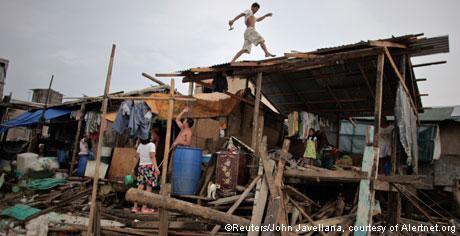Oxfam has a team of ten experts on the ground to assess the water and sanitation conditions in Cagayan de Oro City and Iligan City in southern Philippines, after flash floods brought on by typhoon Washi displaced at least 26,000 families and killed 927.
Oxfam has a team of ten experts on the ground to assess the water and sanitation conditions in Cagayan de Oro City and Iligan City in southern Philippines, after flash floods brought on by typhoon Washi displaced at least 26,000 families and killed 927.
 |
| Flash floods caused by Typhoon Washi have badly affected the southern island of Mindanao in the Philippines. |
The organisation is particularly concerned that affected people, who have lost homes and are now living in cramped evacuation centres, are vulnerable to the outbreak of disease.
Immediate access to safe drinking water, temporary shelter and clean latrines, is needed, as well as the provision of emergency cash transfers. Without bathrooms, women in particular are finding it harder to observe personal hygiene and stave off health risks. Women also face the added burden of caring for sick children; pregnant women face even more difficult times ahead.
Oxfam Humanitarian Officer Noel Pedrola said: “Eighty per cent of Cagayan de Oro has no running water and will remain without for at least a month. This will exacerbate the poor sanitary conditions of evacuation shelters in the days to come, and has wide-ranging implications on public health.”
Oxfam’s team is composed of experts in water and sanitation, livelihoods in emergencies and humanitarian protection.



